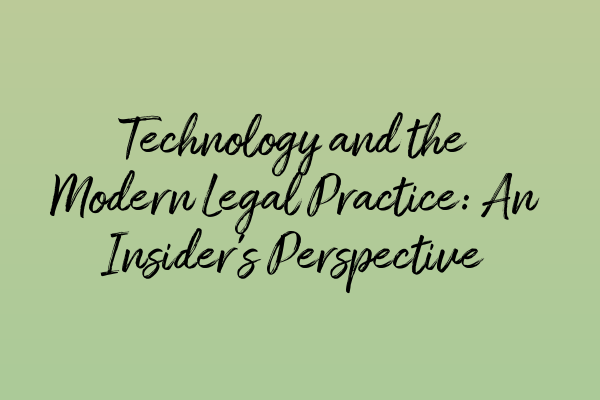Technology and the Modern Legal Practice: An Insider’s Perspective
The legal profession has always been known for its traditional ways of working, with stacks of paperwork, lengthy processes, and a reliance on physical files. However, in recent years, technology has been rapidly transforming the legal landscape, revolutionizing the way legal professionals work and interact with their clients.
Embracing the Digital Era
With the advent of technology, the legal profession is undergoing a significant shift towards digitization. The introduction of advanced software and tools has made it easier for solicitors to manage their caseloads, streamline workflows, and enhance client services. The use of technology has not only improved efficiency but also has had a significant impact on the overall client experience.
One of the most significant changes brought about by technology is the digitization of documents. Gone are the days of sifting through piles of paper files to find a specific piece of information. With the use of document management systems, solicitors can now access and organize important documents with just a few clicks. This saves valuable time and improves productivity, allowing solicitors to focus on providing high-quality legal advice to their clients.
Moreover, technology has also revolutionized communication within the legal profession. With the rise of email, video conferencing, and secure online portals, solicitors can now communicate with their clients and colleagues seamlessly, regardless of their physical location. This has not only increased collaboration among legal teams but has also enabled solicitors to provide more flexible and accessible services to their clients.
Enhancing Client Services
Technology has not only improved internal processes but has also significantly enhanced the services that solicitors can offer to their clients. With the rise of online legal research platforms, solicitors can now easily access vast databases of legal information, enabling them to stay up-to-date with the latest case law and precedents. This allows solicitors to provide more informed and accurate legal advice to their clients, ultimately increasing the chances of a successful outcome.
Another notable development in the legal profession is the use of artificial intelligence (AI) tools. These AI-powered systems can analyze large volumes of data and assist solicitors in preparing legal documents, such as contracts and agreements. By automating repetitive tasks, AI not only saves time but also reduces the chances of human error, ensuring the accuracy of legal documents.
Additionally, technology has also made access to legal services more convenient for clients. Online platforms and mobile applications now allow clients to engage with their solicitors, monitor the progress of their cases, and access important documents from the comfort of their own homes. This has democratized access to legal services, making them more accessible to individuals who may have previously been deterred by factors such as location or cost.
The Future of Legal Practice
As technology continues to advance, its impact on the legal profession is only expected to grow. Emerging technologies such as blockchain and machine learning are poised to further transform the way legal services are delivered.
For example, blockchain technology has the potential to revolutionize the management and verification of legal contracts and transactions. By providing a secure, transparent, and immutable record of transactions, blockchain can increase trust and efficiency in legal processes, reducing the need for intermediaries and making transactions faster and more cost-effective.
Machine learning, on the other hand, has the potential to analyze vast quantities of legal data and identify patterns, trends, and insights that may not be immediately apparent to human researchers. This can help solicitors in building stronger cases, predicting legal outcomes, and providing more personalized legal advice to their clients.
It is clear that the legal profession is standing at the forefront of a technological revolution. The integration of technology into the modern legal practice has not only improved efficiency and accuracy but has also enhanced the overall client experience. As legal professionals continue to embrace new technologies, they are better equipped to meet the evolving needs of their clients in the digital age.
To learn more about the various aspects of the legal profession, check out the following related articles:
- Private Prosecutions: Exploring Non-Governmental Prosecutions in Criminal Cases
- Rights of the Accused: Protecting Individual Liberties in Criminal Proceedings
- Magistrates’ Court vs Crown Court: Understanding Key Differences
- Protecting Vulnerable Witnesses in Criminal Trials: Best Practices and Legal Safeguards
- Unraveling the Complexities of UK Bail Laws


Leave a Reply